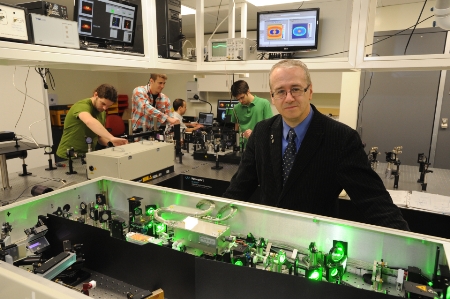A research team led by Professor Michel Meunier from the Polytechnique Montréal has developed a novel transfection technique using gold nanoparticles and a femtosecond laser to change cancer cells’ genetic material.
 Professor Meunier and his team
Professor Meunier and his team
In this technique, gold nanoparticles are deposited on the cells to concentrate the laser energy and enable it conduct a nano-scale surgery in a highly accurate non-invasive manner. This method is capable of changing the gene expression in the cancer cells to slow down their movement, thus preventing metastases formation. This pioneering achievement in nanosurgery paves the way to advance cancer treatments and other innovative medical applications.
This technique is a promising replacement for traditional cellular transfection techniques like lipofection. In the experiment on malignant human melanoma cells, this method showed an optoporation efficacy of 70% and a transfection performance three folds better than that of lipofection treatment. Moreover, contrary to traditional treatments that destroy the cells’ physical integrity, the novel technique ensures cellular viability with below 1% of toxicity.
This significant scientific advancement opens the door to develop promising applications such as novel therapeutic methods in cardiology, neurology, and oncology. The Polytechnique Montréal team works in partnership with scientists from the Department of Medicine at the McGill University Health Centre.
This project is funded by the Deutsche Forschungsgemeinschaft, the Canadian Institutes of Health Research, the Canada Research Chairs program, the Canada Foundation for Innovation, and the Fonds Québécois de la Recherche sur la Nature et les Technologies.
The research team has reported their findings in the journal Biomaterials.